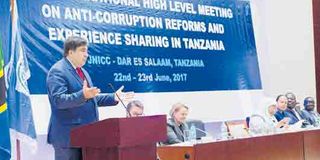W. Bank: How Tanzania can win graft war

What you need to know:
Ms Bella Bird who is in charge of WB issues in Tanzania, Burundi, Malawi and Somalia said reforms are needed to entrench the crackdown against corruption and ensure the war on the vice galvanizes everyone if it is to bear long term benefits.
Dar es Salaam. The government should institutionalise the war on corruption to sustain the current tempo exhibited by President John Magufuli over a longer period, a senior World Bank officials has said.
Ms Bella Bird who is in charge of WB issues in Tanzania, Burundi, Malawi and Somalia said reforms are needed to entrench the crackdown against corruption and ensure the war on the vice galvanizes everyone if it is to bear long term benefits.
She was speaking yesterday during the opening of an international high level meeting on anti-corruption reforms in Tanzania held in Dar es Salaam, jointly funded by the WB and the government.
Vice President Ms Samia Suluhu Hassan and the Prevention and Combating of Corruption Bureau Director General Valentino Mlowola were among those in attendance at the two-day forum to discuss the country’s strategy against the vice.
Ms Bird said President Magufuli has shown an unprecedented determination to fight the vice and has won the heart of many in the country, around the region and internationally. She further noted that the challenge now was to draw a concrete roadmap around such leadership for sustainable results.
“At the World Bank, we are convinced that success in the fight against corruption in Tanzania is essential to the country’s progress in eliminating extreme poverty and generating inclusive growth,” she said during the opening ceremony.
According to the official, both punitive and preventive approaches would be important to move forward. The involvement of the private sector, media, Parliament, business and community groups as well as the ordinary citizens would bring synergy and broader focus.
She underscored the importance of fighting corruption from the top, as is the current case being led by the President since coming to power in 2015. “Values of integrity need to be instilled and rewarded in public service, from senior to the most junior levels. Clear rules need to be established and oversight mechanism need to function so that officials know the rules to follow and are aware of the penalties that will follow if the rules are broken,” Ms Bird said.
It was noted that measures to prevent corruption rather than driving prosecutions alone was desirable. “Stand alone activities cane end up displacing corruption and not reducing it,” the Workd Bank official said, noting that reducing corruption in the health sector, for example, may require greater clarity in the funding of hospitals, a more professionally managed and staffed ministry and improved systems for reporting problems. Tanzania, she suggested, should aim to move to the level where both the public and private players operate with integrity and in accordance with formal rules. Ms Bird promised to work with the government in the journey to establishing a corruption-free society.
In her address, the Minister of State, President’s Office (Public Service Management and Good Governance) Ms Angela Kairuki, said the government was investigating its key institutions that are often being criticised for being corrupt and thereby increasing the cost of doing business in the country and creating inefficiency and wastage of resources.
She named the institutions as Tanzania Ports Authority (TPA), Tanzania Revenue Authority (TRA), the Police Force nd the Judiciary.
“We will not tolerate any forms of corruption that have been hindering the government from achieving its targets, we aim to reach zero corruption soon,” she stressed.
She said the government was shifting into a middle income country and semi industrialized economy with high quality and a sustainable live hoods, peace, stability and unity, good governance and rule of law that can only be achieved if corruption is eliminated. On his part, Mr Mlowola said that they have been able to bring many people to task due to cooperation from the public and called on them to continue exposing them to help the government end corruption in the country.
He said the magnitude of corruption in Tanzania came to an alarming proportion during the post economic liberation era, following privatization of public corporations.
He said that they were currently underway to review the anti-corruption law due to the prevailing conditions. He said that the current government has zero tolerance to corruption stance and that was why it has come up with special Anti-corruption Dvision at the High Court, with so far 15 high profile corruption cases involving prominent people on course.
Noting that the government had also cut out wasteful expenditure and clamped down ghost workers which has raised revenue collection from Sh850 billion to Sh1.2 trillion.
According to him, the government has developed the National Anti-Corruption Strategy and Action Plan (NACSAP) which aims to promote efficiency, transparency and accountability in public and private sectors. Further he said it aims to bring effective enforcement of anti-corruption measures as well as build capacity of watchdogs and oversight institutions.
However he noted that the public continue to see corruption as way of life because the PCCA Act appear to be lenient and the preference of fines over imprisonment waters down the legal sanctions to punish the offenders.
“This discourages the public but also encourages the offenders,” he said. He said asset tracing and recovery under the PCCA is still conviction based and complicates and impedes efficiency of asset recovery in corruption cases.
He said they will continue to devise new strategies to scale up prevention measures and be more proactive as well as wmploy modern techniques in investigation especially in grand corruption cases and deal with petty corruption to ensure public receives services accordingly.
Ms Samia said the government plans to promote integrity, transparency and accountability among government institutions.
She said the government will deal with corruption from the root because tackling corruption is at most in government’s priority.




